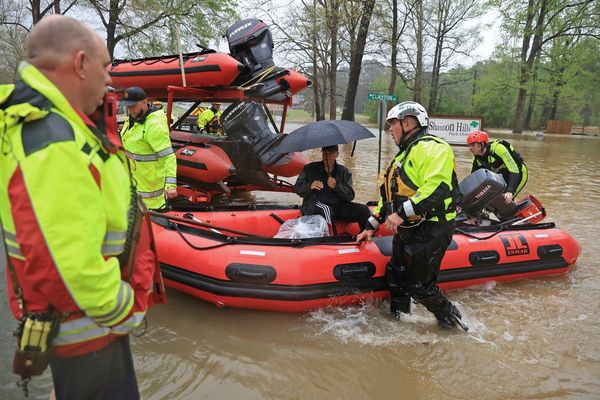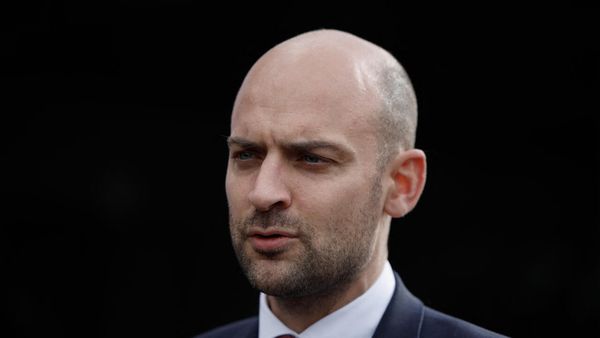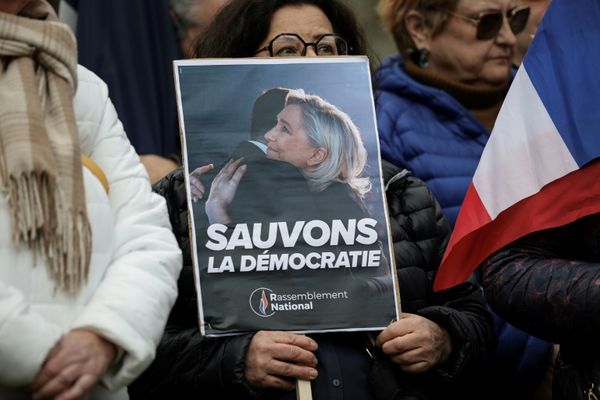
Russia is building up its forces in eastern Ukraine in readiness for a new wave of attacks in the breakaway Donbas region, the Ukrainian president, Volodymyr Zelenskiy, has said, as another attempt was being made to rescue trapped civilians and deliver aid to besieged Mariupol.
In an early morning video address, the Ukrainian president said Russia’s drawdown announcement had been forced upon the Kremlin by the fierce resistance of Ukraine’s armed forces.
He added that his government was instead seeing “a build-up of Russian forces for new strikes on the Donbas” and preparing for that. The region encompasses two self-proclaimed “people’s republics” that Russia says it is helping to free from Ukrainian control. The leader of the self-proclaimed Donetsk People’s Republic, Denis Pushilin, said on Wednesday that offensive operations were intensifying.
Donetsk includes the besieged port city of Mariupol, which has seen some of the war’s heaviest fighting and bombardment and where about 170,000 people are trapped with scarce food and water.
Ukraine’s deputy prime minister Iryna Vereshchuk said on Thursday morning that a convoy of 45 buses were on their way to the city after the International Committee of the Red Cross confirmed Moscow had agreed to open a corridor from 10am local time (7am GMT) for three hours.
Previous attempts to organise safe passage have failed. Moscow denies targeting Ukrainian civilians in its five-week bombardment of the city.
A successful evacuation would build on Russian promises to draw down its forces in some areas before the planned resumption of peace talks on Friday.
Ukraine’s government and its western allies, however, remain wary that Russia is building up its forces in eastern Ukraine in readiness for a new wave of attacks in the breakaway Donbas region, which includes Mariupol. Despite the withdrawal claims, Russian forces have continued to bombard the northern city of Chernihiv and parts of the capital Kyiv.
A renewed move on Donbas would be consistent with Moscow’s claim this week about a withdrawal from some areas to focus on “liberating” the breakaway eastern region
The fate of Donbas, which Russia demands Ukraine cede to the separatists, was a topic of discussion at peace talks held on Tuesday in Istanbul. A senior Ukrainian negotiator said on Wednesday night that the talks would resume online on Friday.
Zelenskiy said the talks had produced nothing “concrete” while one of his senior aides said the Ukrainian leader could meet Putin soon.
The head of Ukraine’s negotiating team, Mykhailo Podolyak, said that Moscow was scrutinising proposals submitted by Kyiv in Istanbul that he believed could lead to a presidential peace summit between the pair. However, a Kremlin spokesman downplayed the hopes of an early breakthrough in the peace talks.
Ukraine has sought a ceasefire without compromising on territory or sovereignty, although it has proposed adopting a neutral status in exchange for security guarantees. Russia opposes Ukraine joining Nato, the western military alliance, and has cited its potential membership as a reason for the invasion.
Zelenskiy also said in his TV address that he talked to Joe Biden for an hour on Wednesday during another “very active diplomatic day”. He said he thanked the US president for a new $1bn (£760m) humanitarian aid package and an additional $500m in direct budget support. Zelenskiy said: “The support of the United States is vital for us. And now it is especially important to lend a hand to Ukraine, to show all the power of the democratic world.”
A possible shift in the military situation in Ukraine came as the head of Britain’s spy services agency claimed Putin had been misinformed about the extent of Russian military failure in Ukraine because his advisers were too frightened to tell him the truth.
Sir Jeremy Fleming, in a speech given in Australia on Thursday, said the Russian leader had misjudged the strength of Ukrainian resistance, the western response and the ability of his forces to deliver a rapid victory.
Fleming, whose comments were backed up by US and EU officials, said that the failure to achieve a quick victory must be causing discord in the Kremlin. “And even though we believe Putin’s advisers are afraid to tell him the truth, what’s going on and the extent of these misjudgments must be crystal clear to the regime.”
Pentagon spokesperson John Kirby agreed and said: “It’s [Putin’s] military. It’s his war. He chose it ... the fact that he may not fully understand the degree to which his forces are failing in Ukraine, that’s a little discomforting.”
In other developments
The Biden administration is considering a plan to release approximately 1 million barrels of oil a day from US reserves for several months, in order to combat rising fuel prices exacerbated by the war in Ukraine, according to Bloomberg.
Germany has triggered the first stage of plans to ration power if the standoff with Russia over gas supplies and sanctions is not resolved. Moscow is demanding payment for energy be made in roubles, but this could undercut western sanctions on Russia and countries are under pressure not to go along with the Kremlin’s plan.
The Russian rouble has recovered to its pre-war value despite western sanctions on the country’s exports and financial systems. The currency was trading at 75.5 to $1 on Thursday morning, compared with almost 140 at the beginning of March when it crashed with the onset of sanctions.
Zelenskiy addressed the Australian parliament on Thursday.
Global restrictions on exports of industrial components to Russia have hit car and tank production. A carmaker has shut down and tank production has halted, according to the US. Baikal Electronics, a Russian semiconductor company and computer manufacturer, has been cut off from integrated circuits to support its surveillance, servers, and other domestic communications equipment.
Liz Truss, Britain’s foreign secretary, is due to land in India on Thursday to urge Narendra Modi’s government to reduce its strategic dependency on Russia. Her arrival coincides with that of her sparring partner Sergei Lavrov, Russia’s foreign minister, who will be making his first visit since Russia’s invasion of Ukraine.
Major jewellers including American brand Tiffany & Co; Swiss watch and jewellery-maker Chopard; Signet, the largest retailer of diamond jewellery; and Pandora, the world’s largest jeweller, have released statements saying they will stop buying diamonds of Russian origin.
The UK has announced new laws targeting the access of Russian oligarchs to “UK aviation and maritime technical services”, according to the Foreign Office.







